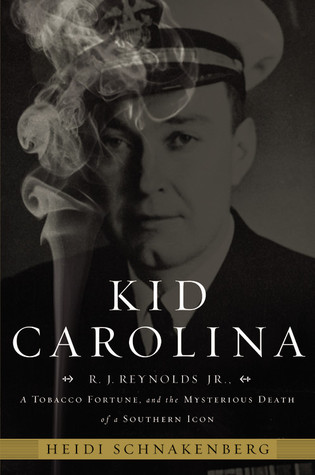Kid Carolina: R. J. Reynolds Jr., a Tobacco Fortune, and the Mysterious Death of a Southern Icon by Heidi Schnakenberg
Summary (from the publisher): The Reynolds tobacco family was an American dynasty like the Rockefellers, Vanderbilts, and Astors. R.J. "Dick" Reynolds Jr. was born into privilege and decadence, but his disastrous personal life eventually destroyed almost every relationship he cherished and stole his health at a relatively young age.Dick Reynolds was dubbed "Kid Carolina" when as a teenager, he ran away from home and stowed away as part of the crew on a freighter. For the rest of his life he'd turn to the sea, instead of his friends and family, for comfort. Dick disappeared for months at a time, leading the dual life of a business mogul and troubled soul, both of which became legendary.
Despite his personal demons, Dick played a pivotal role in shaping twentieth-century America through his business savvy and politics. He developed Delta and Eastern Airlines, single handedly secured FDR's third term election, and served as mayor of Winston-Salem, where his tobacco fortune was built. Yet below the gilded surface lay a turbulent life of alcoholism, infidelity, and loneliness. His chaotic existence culminated in a surprise fourth marriage and was shortly followed by a strange death, the end of a life every bit as awe-inspiring as it was disturbing.
Review: This biography chronicles the life of heir to the Reynolds tobacco fortune, R.J. "Dick" Reynolds Jr. Dick was born into privilege and wealth. But his father's death when he was only 11, followed closely by his mother's death when he was still a teen, coupled with the vast sums of money at his disposal led to a life full of personal demons and excess, particularly when it came to alcohol. His was a life of contradictions. He cruelly left multiple wives after feigning ongoing love, largely abandoned his children, lived a life of extreme extravagance, and could be abusive and cutting, particularly when drunk. But he was also the hero of the every man due to his good works as a mayor Winston-Salem, a generous philanthropist, particularly in his hometown of Winston-Salem, and wasn't afraid of deprivation or physical danger, particularly when it came to life on the sea. Perhaps most befuddling of all are the final years of his life, when he married a mysterious fourth wife, disappeared to Switzerland, apparently disinherited his six sons, and died under suspicious circumstances.
R. J. Reynolds Jr.'s life is absolutely fascinating. Seemingly every page was filled with surprising and shocking events. From stowing away on a boat, the mysterious shooting death of his brother, the colossal sized homes and multiple yachts, the arsenal of fulltime employees, his interest in aviation that led to friendships with Amelia Earhart and Charles Lindbergh to securing FDR's third term as president, this book is quite the ride through his tumultuous life. On a personal level, as someone who has lived and spent a lot of time in Winston-Salem, where he and his family's names are everywhere and their financial legacy evident throughout, it was of personal interest. I loved reading about places I have visited like the Reynolda House, which was originally built by Dick's mother.
It's sad that his father's legacy went so awry in Dick's final years. From the author's account, his father R.J. was an honest man who earned his fortune through hard work and fair treatment of his employees: "R.J. was adored by the city - not just for the jobs he brought to North Carolina, but for his generous treatment of his employees and his philanthropy. Taking his wife's advice, R.J. was one of the first employers in America to implement a nine-to-five weekday and five-day workweek and to offer employees paid benefits, including health care, vacation time, and on-site child care" (20). While glimmers of his father's character and influence are evident in Dick's life, much of it is obscured by alcoholism and excess and Dick certainly never worked so hard or was as devoted to his children as his father. On the other hand, the author didn't even attempt touch the complicated Reynolds legacy of heavy marketing and selling of tobacco to millions of Americans, which seemed like a glaring omission.
My one disappointment with this book was the lack of an experienced biographer to convey Dick's life story. There seems to be a lack of editorial support as well. For instance, literally the first sentence of chapter one says Richard Joshua Reynolds Sr. was from "Critz County, Virginia" but no such place exists and this should read Critz, Virginia (1). This mistake so early on made me question what other mistakes the author made that were left uncorrected, but being unfamiliar with the subject matter, who can say. The writing was also subpar and confusing at times. Like this extreme run-on sentence: "As the Reynolds family resumed tobacco farming, Hardin's boys, including R.J. Sr., who had severe dyslexia and dropped out of college early in his academic career, took wagonloads of tobacco to markets in numerous states, including Tennessee, Kentucky, and North Carolina" (3). The most well written and detailed section of the book is the one from Dick's third wife Muriel's perspective, clearly all gleaned from her memoirs. This comprises a significant chunk of the book and becomes less Dick's biography and more Muriel's. The early chapters, before the author could borrow from Muriel's recollections is more shaky on details and writing style alike. But, despite these weaknesses, I was delighted to read this biography and learn more about a family who have had a tremendous impact on the region where I live but also on the country as a whole.
Stars: 4



Comments
Post a Comment